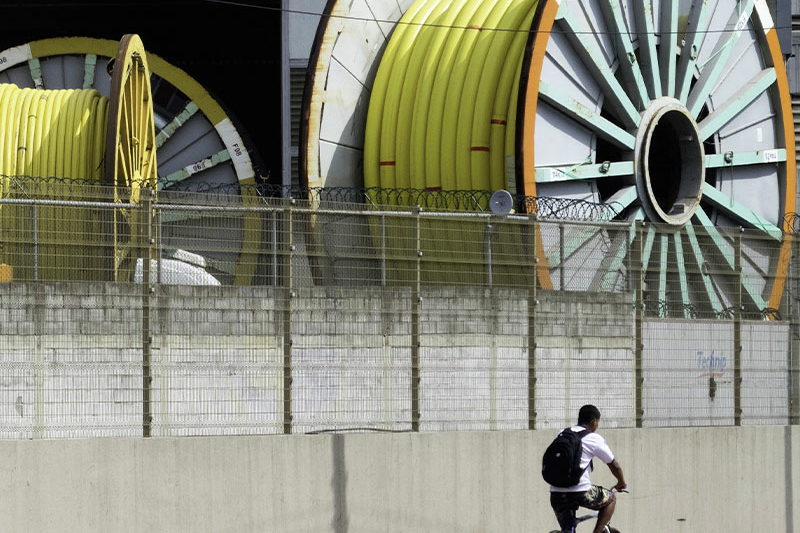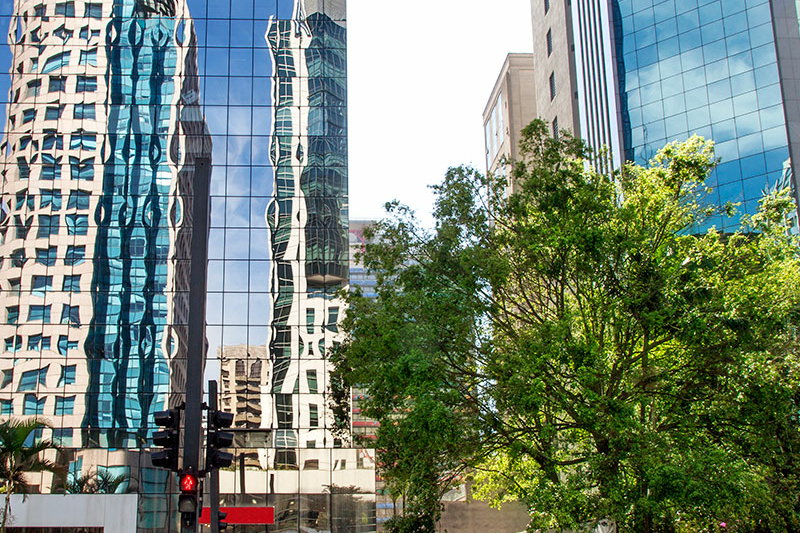Latin American arbitration in transition
A disruptive era portends a new wave of disputes using well-established frameworks for commercial and investment arbitration

By Carlos Viana, Latin America Interest Group Leader and Editor of Latin America Focus
We are delighted to introduce the first edition of Latin America Focus, a publication produced by the Latin America Interest Group at White & Case. Our intent with this publication is to provide market insights from our practices and proprietary research that could be valuable to senior decision-makers who have an interest in the region.
COVID-19 hit Latin America's economies more heavily than it hit any other region around the world. The region's economies contracted by nearly 7 percent in 2020, compared to a global average of only 3 percent. Current projections indicate a healthy recovery through the end of 2021, perhaps by as much as 6.9 percent according to S&P Global,1 and thereafter steady growth of about 2.5 percent per annum.
As we look forward to 2022 – 2023, Latin America, in very significant part, will likely continue to face the ebbs and flows of populism, resource nationalism and weak institutions that seem to take turns at flooding some of the countries in the region from time to time. Yet, we also see Latin America propelled away from the COVID-19 swamp by the powerful global engines of economic, social and technological evolution that will push heavy foreign investment into the region: unprecedented global liquidity and the search for yields in emerging markets, the energy transition, the commitments to mitigate climate change by global natural resources and energy companies, and the technology-driven push to digitize and automate the increasingly global world economy. We saw these global drivers, and foreign investors' net-net belief that Latin America will resurge in the medium term, supporting our cross-border business in the region through a 2020 – 2021 period that we expected at the outset could be cataclysmic for foreign investment in view of the region's endemic challenges.
In this edition of Latin America Focus, partners in our Latin America Interest Group have written articles based on their personal experiences in the trenches and market research that go to the very heart of both the latest sequel in the Latin American saga of transitions, and the current global forces of growth, the interplay of which will likely shape what is to come in post-COVID-19 Latin America.
Times of transition are frequently associated with greater incidences of disputes, notably investor-state disputes, but also commercial disputes, especially in times of supply-chain disruption. In "Latin American arbitration in transition," our team outlines the past and present of commercial arbitration in Latin America, and its prospects for the future.
Latin America has experienced many sovereign debt defaults over the past century. The most recent installment of these usually long-brewing crises played out as COVID-19 partly disabled the region, involving Ecuador, Argentina, Belize and Suriname. Meanwhile, Venezuela continues mired in default for more than three years as of the time of publication. In the article "Sovereign debt restructurings in Latin America: A new chapter," our team explores some of the lessons learned and innovations employed in these recent sovereign debt restructuring exercises, providing insights into the implications for the future of sovereign and sub-sovereign international finance and, more broadly, cross-border restructurings, in the region.
With the COP26 conference being held in Glasgow in November 2021 and concerns about climate change at an all-time high, it is unsurprising that environmental, social and governance (ESG) trends are a recurring sub-theme through several of the articles in this inaugural edition of Latin America Focus. In "Sustainable finance in Latin America," our team focuses directly on green, social and sustainability-linked (GSS) bonds. This article also covers other kinds of sustainable finance, and international environmental agreements in this area to which Latin American countries are signatories.
Our world is being transformed by what the World Economic Forum calls the 4th Industrial Revolution, and Latin America is no exception. Over the next few years, the region is expected to experience faster growth in interconnection bandwidth capacity than any other region in the world. This is especially important for Latin America given the role that connectivity and digital capacity play in driving inclusive economic growth and prosperity. In "Bridging Latin America's digital divide," our team takes a detailed look at investments in digital infrastructure across the region. We focus especially on mobile networks (including 5G), data centers and sub-sea cables, exploring also how these investments are being (and might be) funded.
Latin American equity markets proved remarkably resilient to COVID-19, in terms both of growth in their major indexes and in new initial public offerings (IPOs), and other stock and rights issuances. Brazil, in particular, saw a large number of new publicly listed companies emerge in 2020 – 2021. "Equity capital markets in Latin America" provides a current overview of the state of equity capital markets in Latin America, emphasizing key growth opportunities.
Finally, the first half of 2020 saw a sharp contraction in M&A in Latin America, but deal flow has rebounded strongly in 2021. In "M&A in post-COVID-19 Latin America," our team explores some of the factors that international investors need to take into account when investing in the region's growing markets in view of the current environment. Data drawn from White & Case's global M&A Explorer tool is used to show current trends among various cross-sections of deals.
We do hope that you enjoy reading these insights, and find them valuable. Please do not hesitate to let me know if there are any topics that you would like us to cover in future editions.
A disruptive era portends a new wave of disputes using well-established frameworks for commercial and investment arbitration

Sovereign debt restructuring solutions developed in Latin America during 2020 and 2021 create a new paradigm for sovereign debt restructurings in the region and globally

GSS bonds and other forms of sustainable finance have become a mainstream feature of Latin American debt capital markets

COVID-19 has created strong incentives for investment in digital infrastructure in Latin America, especially in 5G, private networks, data centers and fiberoptic cables

Strong pandemic-era performance and a look around the corner

Established trends driving M&A globally are also reflected in Latin American deal flow


A disruptive era portends a new wave of disputes using well-established frameworks for commercial and investment arbitration
Stay current on your favorite topics
Arbitration is now deeply entrenched in the private and public sectors in Latin America, and will be the key mechanism for international disputes arising out of unfolding transitions in the region.
Latin America faces disruption on a scale not seen in three decades due to the confluence of the global pandemic, the fallout of years of scandals and shifting political perspectives on globalization. While the particular circumstances differ by jurisdiction, arbitration will continue to be the preferred mechanism to resolve resulting disputes. Arbitration institutions and market stakeholders should be prepared for these new changes. Arbitral institutions in Latin America should continue to strengthen their rules and their practices. Market stakeholders who may face arbitrations in the years to come should consider taking steps to avoid or best prepare for these coming disputes, including, for instance: (i) reviewing the dispute resolution clauses in their contracts with commercial actors and state agencies; and (ii) assessing, securing and protecting international investment protections.
Latin America is once again in a state of transition. The disproportionate impact of the global pandemic on Latin American economies, coupled with complex domestic politics and global trends related to globalization, reflects a new and complex turn of the wheel of history in a region historically marked by cycles of nationalization and privatization. This confluence of factors is already triggering new trends in disputes in the region, including commercial and investment disputes. Whereas arbitration was an emergent dispute mechanism at the time of the political and macroeconomic transitions of the 1990s, it is not deeply embedded in the region for the resolution of both private and public sector disputes.
Latin American history was shaped over time by cycles of political and economic regimes that embraced or rejected cross-border investment. Authoritarian regimes rose in the 1970s, and fell in the 1980s. In the 1990s, the end of the Cold War and emergence of the "Washington Consensus" favoring free markets shaped a sea change in the region. Latin American countries overwhelmingly liberalized their economies and embraced globalization in an effort to bolster trade and attract foreign investment. In line with the Washington Consensus, most countries adopted structural adjustment reforms centered on fiscal discipline, tax reform, deregulation of the market, and financial and trade liberalization, among others.1
This turn of the historical cycle was marked by a critical additional element: arbitration. As a component of sweeping reforms, most countries adopted new domestic arbitration laws and ratified international treaties providing for investment protections and access to arbitration. Critically, sovereigns in the region broadly signed on to arbitration, largely abandoning deeply rooted historical resistance to submission to arbitration. As a result, as disputes emerged, they both were handled in new fora and also had the effect of reinforcing the macroeconomic models of the era.2
Some countries went their own way in the 2000s, prompted by a range of ideological and economic factors.3 Argentina, Venezuela, Bolivia and Ecuador turned against pro-investment policies, and against investment arbitration, signaling a backlash against the Washington Consensus.4 The result was not merely political; waves of arbitrations centered on those jurisdictions followed. Meanwhile, until more recent years, many countries largely maintained the underpinnings of the Washington Consensus, at least in principle—including for instance the Pacific Alliance countries of Chile, Colombia, Mexico and Peru. But cracks began emerging over time.
Over recent years, a confluence of factors have impacted the relative continuity of the historical cycle in the region that persisted over the past quarter-century and, mostly, through the global recession of more than a decade ago.
First, the assumptions of the post-Cold War era of globalization have been shaken. The Brexit vote in the United Kingdom in 2016 is the most blatant symbol of this shift, but for the Americas, there is another example that marked a turning point in 2016: the demise of the participation of the US in the Trans-Pacific Partnership (TPP). The US was an architect and champion of the Washington Consensus, and developed the TPP as a broad alliance of like-minded countries. The TPP also constituted the realization of a form of the long-imagined free trade agreement of the Americas, including the NAFTA countries plus Chile and Peru. It promised to consolidate the Washington Consensus at a time when contrarian countries like Ecuador and Venezuela were faltering. Instead, the US exited the TPP, and support for free trade and investment agreements deteriorated significantly in the US.5 The replacement of NAFTA with the US-Mexico-Canada agreement reflected the complex mix of continuity and change.
In the context of a broad debate over globalization, Latin American countries were impacted by a series of complex corruption issues that impacted established political order and assumptions.
As a further addition to this complex confluence of factors, the COVID-19 pandemic hit the region hard, exacerbating existing economic and political fault lines. As a region, Latin America experienced the sharpest contraction in gross domestic product (GDP), namely 7 percent, compared to a global average of 3 percent. Peru experienced an especially severe contraction, with GDP shrinking by 11 percent in 2020.6
The impact of the pandemic reverberated through Latin American politics, reflecting especially in countries where general elections took place. In April 2021, for example, Peruvian citizens elected a leftist former schoolteacher and union leader, Pedro Castillo,7 who spoke against globalization during his campaign. In Colombia, violent protests broke out after the government announced a new tax reform that purported to shrink deficits that grew during 2020. Following sustained blowback, the reform was withdrawn, but protests have continued with expanded demands.8 Other countries with traditionally economically open economies, such as Chile, have also begun taking measures that may signal a return to more nationalist economies.9 Policies instituted in Brazil under President Jair Bolsonaro and in Mexico under President López Obrador seem to confirm how deeply nationalist movements are linked to anti-globalization sentiments.
Time will demonstrate whether the disruption of recent years, and the pandemic, is a sign of permanent disruption of core components of the Washington Consensus, or merely a detour. Despite broad political drama, many core tenants of the prescriptions for economic growth in the 1990s, such as a focus on fiscal responsibility, have persisted, and there are mixed political developments. For instance, Ecuador is returning to a model friendlier to foreign direct investment (FDI) under recently elected President Guillermo Lasso, proclaiming that he wants "more Ecuador in the world and more of the world in Ecuador."10 In his inaugural presidential speech, Lasso promised to put an end to former President Rafael Correa's caudillo era, and to restore fair economic trade for the country.11 Two months into his presidency, Lasso enacted a new hydrocarbon policy that had immediate effects.12 Under the new hydrocarbon policy, Ecuador will once again allow foreign companies to exploit petroleum resources in its oil fields.13
These diverse factors impacting policies in Latin America present challenges and opportunities for trade and investment in the region, as countries' different leaders focus on closing, opening or expanding certain markets. This shifting historical and political context must be assessed carefully with respect to the particulars of any particular deal or dispute, and caution is required in this regard. What is certain is that factors portend future disputes, and have implications for commercial and investment arbitrations.
Building on historical examples of the use of arbitration in the region,14 the framework for commercial arbitration across the region was consolidated during and after the 1980s and 1990s.15 Over the past quarter-century, Latin America has broadly embraced commercial arbitration as an alternative to domestic courts to resolve disputes. Over the past 30 years, commercial arbitration has consequently become far more ubiquitous in the region's jurisdictions. Strong arbitral institutions have emerged and grown, and national legal frameworks have been enhanced to support arbitration in the region.16 In short, arbitration is now deeply entrenched in the private and public sectors in Latin America, and will be the key mechanism for international disputes arising out of unfolding transitions in the region.
The trends described above are likely to increase the range and number of disputes and hence commercial arbitrations stemming from international business transactions involving Latin America.
Latin American legal frameworks for commercial arbitration mostly have been solidified, and regional arbitral institutions have emerged as robust leaders for the continued growth of the field as new types of disputes emerge.
Latin American legal frameworks for commercial arbitration mostly have been solidified, and regional arbitral institutions have emerged as robust leaders for the continued growth of the field as new types of disputes emerge. With the support of global arbitral institutions, Latin American jurisdictions began, toward the end of the 20th century, to create legal infrastructure to accommodate commercial arbitrations. As regulatory frameworks, they adopted the 1958 New York Convention on the Recognition and Enforcement of Foreign Arbitral Awards (the New York Convention), which provides a regime for the enforcement and recognition of arbitral awards within its 157 contracting states, and the 1975 Inter-American Convention on International Commercial Arbitration (Panama Convention). National laws were also enacted that follow the United Nations Commission on International Trade Law (UNCITRAL) Model Law on International Commercial Arbitration.
In 2011, the Institute for Transnational Arbitration (ITA), with White & Case LLP, undertook an unprecedented survey, to better understand the landscape of arbitration in Latin America. It focused on legal frameworks and institutions in the region. This survey discovered that regulatory and policy shifts toward globalization and free trade in the 1990s in Latin America17 was accompanied by an increase in arbitral institutions.18 More than half of Latin America's arbitral institutions were established between 1997 and 2002.19
While most of these arbitral institutions resolve disputes between local parties, a significant and increasing number settle disputes involving foreign parties.20 In some, such as the International Center for Conciliation and Arbitration in Costa Rica and the Arbitration Center of the Peruvian American Chamber of Commerce Peru, cases involving foreign parties now make up a significant percentage of their caseload. In the same vein, while the majority of cases involve private parties, the percentage of public parties represented is growing steadily.21
As disputes become more complex, they also tend to involve multiple parties. While most disputes in Latin America still involve only two parties, this is changing. Again, Brazil's Market Arbitration Chamber leads the region, with 80 percent of its caseload involving more than two parties.22 Overall, the trends uncovered in the ITA's study indicate that the rest of Latin America will soon see more complex disputes, as the nature of arbitration in the region becomes more multifaceted. Overall, the data in the inaugural study confirmed that Latin American arbitral institutions were becoming increasingly sophisticated and reliable.23
As in the rest of the world, in Latin America international arbitration is the preferred method to resolve cross-border disputes.24 In recent years, Latin American countries have worked to modernize their legal frameworks to accommodate international arbitration and the arbitration of cross-border disputes.
The "seat of the arbitration" is critical to maximizing the efficacy of arbitration and avoiding the risk of jurisdictions with newer laws or less reliable enforcement. A party may be limited to seek to set aside an arbitration award at the domestic courts of the seat of arbitration. Accordingly, the law and practice governing how the courts of the seat handle set-aside proceedings is critical. In addition, the choice of the seat may affect other important considerations, such as confidentiality, the degree of judicial intervention in an arbitration proceeding, and whether an arbitral tribunal may issue or enforce interim measures.25 Choosing an appropriate seat of arbitration is therefore critical.
The most recent White & Case and Queen Mary University Survey confirmed that the preferred seats to arbitrate Latin American disputes in 2021 were Paris, New York, São Paulo, Singapore and Geneva.26 The Survey also showed that other seats were growing in reputation and popularity. For example, 2 percent to 4 percent of respondents named other cities in terms of arbitral seat appointments, including Washington, DC and Miami.27 Among those surveyed in Latin America, Paris (64 percent), New York (54 percent), and São Paulo (21 percent) were ranked as the three preferred seats. Miami (15 percent), Lima (6 percent) and Madrid (5 percent) were also among the eight preferred seats.
These Survey results show the continued trend of Miami as a preferred seat for Latin American arbitration.28 This can be attributed to the efforts of the local legal community to develop both the legal and institutional infrastructure to support the locale as a seat. For instance, in 2010, Florida implemented the Florida International Commercial Arbitration Act, a state law based on the UNCITRAL Model Law.29 Further, in 2013, the state created the International Commercial Arbitration Court, within the civil division of state courts—one of the few specialized courts in international arbitration in the US. The Florida Bar has also supported these developments, allowing foreign lawyers to practice arbitration hearings without being members of the Florida Bar.30
In recent years, Latin American countries have attracted the interest of foreign companies that have begun developing very significant construction projects in the region. For example, Spanish construction companies are involved in the construction of new airports, highways, ports and railways throughout the continent including in Colombia, Peru, Chile, Mexico and Panama.31 China's involvement in the infrastructure development in Latin America is also prominent, with the country investing a total of US$86 billion in 59 construction projects in 2019.32
While foreign construction projects are advancing full steam ahead, Latin American regulations of construction projects have lagged. Unsurprisingly, construction and commercial disputes are on the rise. In 2021, a Spanish newspaper article reported that more than €4 billion is at stake in commercial arbitrations in the region, arising between Spanish construction companies and Latin American entities.33
Investment protections and arbitration remain critical to doing business across borders, and the rise of environmental, social and governance (ESG) issues portends future battlegrounds for investment disputes. ESG reporting and regulatory requirements are evolving rapidly and frequently differ significantly across jurisdictions and industries. This can lead to the disruption of existing commercial contracts, in turn giving rise to disputes. For example, the International Maritime Organization (IMO) (the specialized unit of the United Nations responsible for global shipping regulation) agreed at its last meeting in June 2021 to re-open discussions on putting a price on shipping companies' emissions.34 At least in its most ambitious forms, this proposal could radically overhaul the way in which ships operate.35 It is foreseeable that disputes will arise to determine who should shoulder the cost of innovation, policy implementation or even liability for non-compliance—for instance among shippers, fuel providers and other actors in the supply chain.
This is just one example of a raft of ESG policies with which organizations are expected to comply. This trend will draw further attention following the United Nations 2021 Climate Change Conference (COP26) in Glasgow in November.
Investment protections and arbitration remain critical to doing business across borders, and the rise of environmental, social and governance (ESG) issues portends future battlegrounds for investment disputes.
Investor-state dispute settlement (ISDS) is a system to resolve disputes between foreign investors and host states. Consent to investment arbitration is given by the host state in an international investment agreement (IIA), which takes shape as a bilateral investment treaty (BIT) with another state, a free trade agreement (FTA), or a multilateral agreement such as the Energy Charter Treaty (ECT). Consent to investment arbitration may also be found in investment agreements concluded directly between the host state and the investor. International investment arbitration allows a foreign investor to seek redress for state conduct that has harmed it before a neutral forum, thereby bypassing national courts that might be biased toward their respective states and result in significant delays.36
While the substantive protections in each IIA may differ, the most common protections afforded to foreign investors are:
An investor can take advantage of treaty protections in various ways, for instance by structuring the investment in a manner that provides the best coverage. In many cases, company incorporation in a state that is party to an IIA suffices to establish corporate nationality that attracts the desired treaty protection.37
Latin American countries are parties to hundreds of IIAs, which provide for investor-state dispute settlement proceedings, often at the International Center for the Settlement of Investment Disputes (ICSID) established under the auspices of the World Bank in Washington, DC. Given the continent's history of changing political economies, it is unsurprising that Latin American countries have been among the states that have faced the most claims at ICSID since it began operating in the 1980s. A 2017 report prepared by the Transnational Institute indicates, for example, that by 2017, 28 percent of respondents in ICSID cases were from Latin America.38 It further notes that the states facing the most claims in the region include Argentina, Venezuela, Mexico, Bolivia, Peru and Ecuador; and that in fact, taken together, "the number of claims against these countries accounts for 77.3 percent of the total number of claims against [Latin American] countries."39 In the past ten years, four of the 13 most frequent respondent states are Latin American.40
Disruptions in Latin America have not meaningfully undermined access to investor-state arbitration, and they will likely generate more investment disputes in Latin America, as described below.
During the 1990s, Latin American states entered into an array of IIAs as part of their policies of economic liberalization and deregulation. When several of these countries traded open-market economies for nationalist ones in the 2000s, countries like Argentina, Ecuador and Bolivia threatened to terminate IIAs. This caused some at the time to cast doubt on the future of investment treaties and investment arbitration in Latin America.
Bolivia, Ecuador and Venezuela did eventually terminate their investment treaties and withdrew from the Convention on the Settlement of Investment Disputes between States and Nationals of Other States (ICSID Convention) in 2007, 2010 and 2012 respectively. Investment arbitration however, and international investment agreements in Latin America, have persistently stood the test of time.41 Latin American countries continued signing new investment arbitration agreements, even recently. Even those countries that favor anti-globalization participate in investment arbitration proceedings and generally comply with arbitral awards.42 Furthermore, given the presence of "survival clauses" or "sunset clauses" in the investment treaties of Ecuador, Bolivia and Venezuela, those countries continued facing investment-arbitration proceedings for years after they terminated certain agreements. (Survival clauses allow the BIT to continue to have a legal effect even after the BIT itself has been terminated, usually ranging from ten to 20 years.)43
At the same time, the moves years ago by a trio of countries did not lead to a trend of disruption of access to investment arbitration. Indeed, Mexico itself became a party to the ICSID Convention in 2018 in the context of re-negotiations of the North America Free Trade Agreement (NAFTA)44 (whereas Mexico disputes previously were conducted under the ICSID Additional Facility Rules).45 Similarly, in 2021 Mexico conditioned any economic deal with Ecuador to that country's joining of the ICSID.46 For its part, Ecuador, which for the past decade embraced a state-centric model and denounced the ICSID Convention, recently re-joined the instrument, by signing the ICSID Convention in June of 2021. In summary, continuity of access to investment arbitration is likely.
Given that Latin America's economies are not homogeneous, it is difficult to predict how current socio-political and economic trends are likely to influence challenges and opportunities to investment arbitration in the region. Some patterns can be identified, though, that might characterize the years to come.
Expropriation of private assets and nationalization of private industries is a recurring element of Latin American disputes over history, including with respect to states that effectively rejected globalization in the early 2000s.47 Some states, such as Bolivia, Ecuador and Venezuela, nationalized foreign investments, particularly in the oil & gas sector. In other countries and sectors, state conduct to the detriment of foreign investors has been more subtle and incremental. For instance, governments might promulgate measures purporting to protect the environment or some other public policy objective that, in effect, harm or discriminate against foreign investors.
With the return of many Latin American countries to nationalist economies and populist policies, threats to foreign investor assets loom on the horizon. While any particular country, or case, requires careful and particularized analysis, some trend lines are evident.
By Rafael Llano, Ismael Reyes Retana and Francisco de Rosenzweig
President López Obrador's government has taken steps that have impacted investment in key sectors of the economy. Among other examples, the National Center for Energy Control and the Mexican Energy Secretariat have cancelled bids and introduced changes to the regulations governing the issuance of Clean Energy Certificates. On March 9, 2021, Mexico published an amendment to the Electric Power Industry Law (Ley de la Industria Eléctrica), which seeks to benefit the Federal Commission of Electricity and the power generation plants owned by its subsidiaries, displacing clean and renewable energy plants, as well as more efficient and privately owned thermal power plants. President López Obrador has appeared to justify his views on the pretext that the energy private sector has "failed" Mexico.
More recent developments go further. On September 30, 2021, President López Obrador sent to Congress a bill to amend the Constitution with respect to the electricity sector (the "Initiative"). The Initiative proposes to dismantle the current legal framework and give full control of the national electricity sector to the state. In particular, the Initiative provides that, among other things: (i) the state, through the Federal Electricity Commission (CFE), will exclusively carry out all activities in the electricity industry, including dispatch procedures; (ii) existing power generation permits, power purchase agreements (PPAs), and energy certificates be cancelled; (iii) pending requests related to permits and contracts be rejected; and (iv) limitations capping private sector power plants' dispatch to up to 46 percent of the power that the country requires. The Initiative also includes changes to the hydrocarbons and mining sectors, particularly with respect to the regulation of "strategic" minerals, such as lithium. The political fate of the Initiative is uncertain. The country is currently facing 12 investment-arbitration cases, some related to alleged government takings.
These developments are likely to lead to more investment disputes involving respondent states, such as Chile, Colombia and Peru, that faced comparatively fewer cases in the past than countries like Argentina and Venezuela.57
This trend is already playing out. Indeed, as of January 2021, Peru rose to the top of the list of Latin American countries with the most pending ICSID cases, and there were 17 investor-state cases pending against Colombia.58
Finally, as the coronavirus pandemic has adversely affected Latin American economies, governments are looking for ways to recover their economies, at times by taking steps that will impact the private sector and investment. It is plausible that a fresh wave of investor-state arbitration cases against Latin American sovereigns will arise in response to these measures. Although it may be too early to conclude whether or to what extent pandemic-related claims will emerge in the coming years, the measures taken by certain Latin American countries in response to the pandemic may be in breach of investment-treaty protections and guarantees.
Indeed, already one state–Chile–is facing arbitration before the ICSID for claims related to the pandemic. On August 13, 2021, the ICSID registered a claim initiated by a French consortium against Chile claiming US$37 million in losses due to the COVID-19 pandemic.59 According to the French investors, the consortium saw profits fall by 90 percent in 2020, as Chile lost 19 routes and 630 weekly frequencies since the pandemic broke out.60 In June 2020, a road concessionaire notified Peru of a potential claim related to certain emergency measures taken during the pandemic affecting toll roads.61
On balance, disruption in Latin America is likely to provoke new disputes, while maintaining the robust commercial and investment arbitration frameworks that did not exist decades ago, but are now firmly established in the region.
1 Prateek Agarwal, Washington Consensus, Intelligent Economist, April 30, 2018, available at: https://www.intelligenteconomist.com/washington-consensus.
2 Hamilton, Jonathan C., et al., "Latin American Arbitration and Investment Protection," in Latin American Investment Protections: Comparative Perspectives on Laws, Treaties, and Disputes for Investors, States, and Counsel (Jonathan C. Hamilton, et al., eds.) (Brill, 2012).
3 Wanted: A New Regional Agenda for Economic Growth, The Economist, April 26, 2003, available at: https://www.economist.com/the-americas/2003/04/24/wanted-a-new-regional-agenda-for-economic-growth.
4 Judith A. Teichman, The Washington Consensus in Latin America, December 2018, available at: https://www.researchgate.net/publication/329702242_The_Washington_Consensus_in_Latin_America.
5 Shawn Donnan, Trump's Take on Trade Sounds a Lot Like Ocasio-Cortez's Brand of Socialism, Bloomberg, February 13, 2019, available at: https://www.bloomberg.com/news/articles/2019-02-13/trump-s-take-on-trade-echoes-ocasio-cortez-s-brand-of-socialism; Andrew Marantz, Are We Entering a New Political Era?, The New Yorker, May 24, 2021, available at: https://www.newyorker.com/magazine/2021/05/31/are-we-entering-a-new-political-era.
6 Why Latin America's Economy Has Been So Badly Hurt by COVID-19, The Economist, May 15, 2021, available at: https://www.economist.com/the-americas/2021/05/13/why-latin-americas-economy-has-been-so-badly-hurt-by-covid-19.
7 Martín Mejía, Trumpian Tactics Threaten to Undo Democracy in Peru, The New York Times, June 23, 2021, available at: https://www.nytimes.com/2021/06/23/peru-election-castillo-fujimori.html; James Attwood and Valentina Fuentes, The World's Top Copper Nation Moves Closer to Giant Tax Hike, Bloomberg, May 6, 2021, available at: https://www.bloomberg.com/news/articles/2021-05-06/in-top-copper-nation-chile-a-giant-tax-hike-moves-a-step-closer.
8 Andrew Rosati and Extra Fieser, Backlash to Colombia Tax Reform Shows It's Too Soon for Austerity, Bloomberg Law, May 13, 2021, available at: https://www.bloomberg.com/news/articles/2021-05-13/colombia-s-tax-reform-backlash-warns-others-not-to-balance-budgets-just-yet.
9 See A Constitutional Convention in Chile Could Forge a New Social Contract, The Economist, May 18, 2021, available at: https://www.economist.com/the-americas/2021/03/18/a-constitutional-convention-in-chile-could-forge-a-new-social-contract.
10 Jonathan C. Hamilton, Francisco Jijón & Pedro Izquierdo, The Return of Investment Protections in Ecuador, June 25, 2021, available at: https://www.whitecase.com/publications/alert/return-investment-protections-ecuador.
11 Yalile Loaiza, 10 Cambios Clave Que Propuso Guillermo Lasso en su Primera Semana Para Decirle "Adiós" Al Correísmo en Ecuador, Infobae, May 30, 2021, available at: https://www.infobae.com/america/america-latina/2021/05/30/10-cambios-clave-que-propuso-guillermo-lasso-en-su-primera-semana-para-decirle-adios-al-correismo-en-ecuador/.
12 Lucía Vásconez, Presidente Lasso Lanza Nueva Política de Hidrocarburos Para Los Próximos 100 Días, El Comercio, July 7, 2021, available at: https://www.elcomercio.com/actualidad/negocios/guillermo-lasso-politica-hidrocarburos-ecuador.html.
13 Redaccion Vistazo, Lasso Oficializa Nueva Política Hidrocarburífera: "Debemos Explotar Responsablemente El Crudo Que Tenemos," Vistazo, July 7, 2021 available at: https://www.vistazo.com/politica/nacional/lasso-oficializa-nueva-politica-hidrocarburifera-JG495975.
14 See, e.g., MMA Consultants 1, Inc. v. Republic of Peru, 245 F. Supp. 3d 486 (S.D.N.Y. 2017); see also MMA Consultants 1, Inc. v. Republic of Peru, 17-1157 (2d Cir. Dec. 19, 2017).
15 See, e.g., Horacio Grigera Naón, Arbitration in Latin America: Overcoming Traditional Hostility (An Update), Inter-American Law Review, p. 204 (1991) (noting that the ways in which Latin America has changed during the past years by embracing and ratifying international laws and conventions related to arbitration).
16 Jonathan C. Hamilton, Three Decades of Latin American Commercial Arbitration, University of Pennsylvania Journal of International Law (2008) (including a compendium of Latin American arbitration laws and treaties).
17 The Inaugural Survey of Latin American Arbitral Institutions, Institute for Transnational Arbitration (ITA), 2011 (Jonathan C. Hamilton and Eduardo Zuleta, eds.), pp. 3, 13 available at: https://www.cailaw.org/media/files/ITA/Publications/arbitral-institutions-guide-dec.pdf.
18 Id. at 13.
19 Id.
20 Id. at 14.
21 Id. at 15.
22 Id. at 16.
23 Id.
24 White & Case, and Queen Mary University International Arbitration Survey (2021), p. 4, available at: https://www.whitecase.com/publications/insight/2021-international-arbitration-survey.
25 See generally Alexander J. Belohlávek, Importance of the Seat of Arbitration in International Arbitration: Delocalization and Denationalization of Arbitration as an Outdated Myth, (2013), 31, ASA Bulletin, Issue 2, p. 262-292, available at: https://kluwerlawonline.com/journalarticle/ASA+Bulletin/31.2/ASAB2013030.
26 White & Case, and Queen Mary University International Arbitration Survey (2021), p. 9, available at: https://www.whitecase.com/publications/insight/2021-international-arbitration-survey.
27 White & Case, and Queen Mary University International Arbitration Survey (2021), p. 9, available at: https://www.whitecase.com/publications/insight/2021-international-arbitration-survey.
28 This is consistent with the general trend in the region, where Latin American countries are becoming more attractive as arbitration seats. See, e.g., Latin America Becoming More Attractive as an Arbitration Set, Latin Lawyer, April 28, 2017, available at: https://latinlawyer.com/latin-america-becoming-more-attractive-arbitration-seat.
29 Lisa Bench Nieuweld, Florida's Arbitration Act Now Incorporates the UNCITRAL Model Law on International Commercial Arbitration, August 4, 2010, available at: http://arbitrationblog.kluwerarbitration.com/2010/08/04/effective-july-1-2010-floridas-arbitration-act-now-incorporates-the-uncitral-model-law-on-international-commercial-arbitration/.
30 Rule 1-3.11 Appearance by Non-Florida Lawyer in an Arbitration Proceeding in Florida, available at: https://www.floridabar.org/rules/rrtfb/.
31 Valentín Bustos, Polvorín Para Las Constructoras: Más de 4.000 Millones en Arbitrajes en Latinoamérica, El Espanol, June 24, 2021, available at: https://www.elespanol.com/invertia/empresas/construccion-infraestructuras/20210624/polvorin-constructoras-millones-arbitrajes-latinoamerica/591192303_0.html.
32 China Is Building Big in Latin America, Here's Why, Latin Post, November 20, 2019, available at: https://www.latinpost.com/articles/142647/20191120/chinas-large-scale-construction-projects-in-latin-america.html.
33 Valentín Bustos, Polvorín Para Las Constructoras: Más de 4.000 Millones en Arbitrajes en Latinoamérica, El Espanol, June 24, 2021, available at: https://www.elespanol.com/invertia/empresas/construccion-infraestructuras/20210624/polvorin-constructoras-millones-arbitrajes-latinoamerica/591192303_0.html.
34 Maria Gallucci, A Proposal to Make Cargo Ships Pay for Pollution Is Making Waves, Grist, July 7, 2021, available at: https://grist.org/climate-energy/a-proposal-to-make-cargo-ships-pay-for-pollution-is-making-waves/.
35 Maria Gallucci, A Proposal to Make Cargo Ships Pay for Pollution Is Making Waves, Grist, July 7, 2021, available at: https://grist.org/climate-energy/a-proposal-to-make-cargo-ships-pay-for-pollution-is-making-waves/.
36 Jonathan C. Hamilton, "A Decade of Latin American Investment Arbitration," in Latin American Investment Treaty Arbitration: The Controversies and Conflicts (Kluwer 2008).
37 See, e.g., Italy–Korea BIT (1989) Art. 2(3); Italy–Poland BIT (1989) Art. 1(4); Italy–Argentina BIT (1990) Art. 1(2); Italy–Algeria BIT (1991) Art. 1(3); Italy–Albania BIT (1991) Art. 1(2); Argentina–China BIT (1992) Art. 1(2); Chile–Norway BIT (1993) Art. 1(1). See also Barcelona Traction, Light and Power Co, Ltd (Belgium v Spain), Judgment, 5 February 1970, ICJ Reports (1970), p. 70 ("The traditional rule attributes the right of diplomatic protection of a corporate entity to the State under the laws of which it is incorporated and in whose territory it has its registered office. These two criteria have been confirmed by long practice and by numerous international instruments.")
38 See Transnational Institute, ISDS in Numbers, Impacts of Investment Arbitration Against Latin America and the Caribbean, 2017, p. 3, available at: https://www.tni.org/files/publication-downloads/isds_en_numerosen2017.pdf.
39 See Transnational Institute, ISDS in Numbers, Impacts of Investment Arbitration Against Latin America and the Caribbean, 2017, p. 3, available at: https://www.tni.org/files/publication-downloads/isds_en_numerosen2017.pdf.
40 United Nations UNCTAD, Investor–State Dispute Settlement Cases: Facts And Figures 2020, Issue 4, September 2021, available at: https://unctad.org/system/files/official-document/diaepcbinf2021d7_en.pdf.
41 Here to Stay, Latin Lawyer, 2019, available at: https://latinlawyer.com/here-stay-0.
42 See, e.g., Gold Reserve Inc. v. Bolivarian Republic of Venezuela (ICSID Case No. ARB(AF)/09/1) (where Venezuela actively participated as a respondent in a case filed by the claimant on October 21, 2009); Abaclat and Others v. Argentine Republic (ICSID Case No. ARB/07/5) (formerly Giovanna a Beccara and Others v. The Argentine Republic) (where Argentina actively participated as a respondent, in a case filed on September 14, 2006); Pan American Energy LLC v. Plurinational State of Bolivia (ICSID Case No. ARB/10/8) (where Bolivia actively participated as a respondent in a case registered on April 12, 2010).
43 Nathalie Bernasconi-Osterwalder et al., Terminating a Bilateral Investment Treaty, IISD, 2020, available at: https://www.iisd.org/system/files/publications/terminating-treaty-best-practices-en.pdf.
44 Jonathan C. Hamilton & Rafael Llano, ICSID Continues to Grow as Convention Comes Into Force for Mexico, White & Case, August 27, 2018, available at: https://www.whitecase.com/publications/alert/icsid-continues-grow-convention-comes-force-mexico. See also ICSID, Mexico Ratifies the ICSID Convention, July 27, 2018, available at: https://icsid.worldbank.org/news-and-events/news-releases/mexico-ratifies-icsid-convention.
45 See, e.g., Metalclad Corporation v. United Mexican States (ICSID Case No. ARB(AF)/97/1); Robert Azinian and others v. United Mexican States (ICSID Case No. ARB(AF)/97/2); Técnicas Medioambientales Tecmed, S.A. v. United Mexican States (ICSID Case No. ARB(AF)/00/2); Corn Products International, Inc. v. United Mexican States (ICSID Case No. ARB(AF)/04/1).
46 Ecuador's participation in Latin America's Pacific Alliance is also conditioned on the country joining ICSID. Alexandra Valencia, Ecuador Aims to Rejoin World Bank Tribunal in Bid for Investment, Nasdaq, June 21, 2021, available at: https://www.nasdaq.com/articles/ecuador-aims-to-rejoin-world-bank-tribunal-in-bid-for-investment-2021-06-21.
47 See, e.g., Aguas del Tunari, S.A. v. Republic of Bolivia (ICSID Case No. ARB/02/3) (regarding the nationalization of a water system in Cochabamba); Repsol, S.A. and Repsol Butano, S.A. v. Argentine Republic (ICSID Case No. ARB/12/38) (relating to the nationalization of an oil company in Argentina); Occidental Petroleum Corporation and Occidental Exploration and Production Company v. The Republic of Ecuador (ICSID Case No. ARB/06/11) (concerning the expropriation of an oil concession granted to Occidental Petroleum's subsidiary in Ecuador); see also Lauren Freyer, Spain Concerned by Expropriation in Latin America, May 3, 2012, available at: https://www.npr.org/2012/05/03/151915911/take-over-moves-by-bolivia-argentina-angers-spain.
48 Pablo Abufom, Chileans Voted for an End to Neoliberalism, Jacobin Magazine, May 22, 2021, available at: https://www.jacobinmag.com/2021/05/chile-may-elections-constitutional-convention-new-constitution-frente-amplio-chilean-communist-party-alliances-left-bloc.
49 Pablo Abufom, Chileans Voted for an End to Neoliberalism, Jacobin Magazine, May 22, 2021, available at: https://www.jacobinmag.com/2021/05/chile-may-elections-constitutional-convention-new-constitution-frente-amplio-chilean-communist-party-alliances-left-bloc.
50 Fernández, a 18 Fondos de Inversión:"Quiero Alentarlos a Que Vuelquen su Mirada en La Argentina," March 16, 2021, available at: https://www.telam.com.ar/notas/202103/547602-alberto-fernandez-fondos-de-inversion.html.
51 Nathaniel Parish Flannery, Political Risk Analysis: What Do Investors Need to Know About Colombia's 2022 Election?, Forbes Magazine, July 12, 2021, available at: https://www.forbes.com/sites/nathanielparishflannery/2021/07/12/political-risk-analysis-what-do-investors-need-to-know-about-colombias-2022-election/?sh=332ae698f0f9.
52 Sibylla Brodzinsky, Who's Afraid of Gustavo Petro?, American's Quarterly, October 31, 2017, available at: https://www.americasquarterly.org/fulltextarticle/whos-afraid-of-gustavo-petro/.
53 Ernesto Londolo & Daniel Politi, Former Argentine President Seeks Return to Power, as Vice President, The New York Times, May 18, 2019, available at: https://www.nytimes.com/2019/05/18/world/americas/argentina-kirchner-vice-president.html.
54 Jonathan Gilbert, Argentina Seizes Top Soy Exporter in New "Statist Vision," Bloomberg, June 8, 2020, available at: https://www.bloomberg.com/news/articles/2020-06-08/argentina-to-expropriate-troubled-grain-processor-vicentin.
55 Fernández, a 18 Fondos de Inversión: Quiero Alentarlos a Que Vuelquen su Mirada en La Argentina, Politica, March 16, 2021, available at: https://www.telam.com.ar/notas/202103/547602-alberto-fernandez-fondos-de-inversion.html; Daniela Sirtori-Cortina and James Attwood, Peru Mining Candidate Seeks Bigger Cut From Mining, Not State Control, Bloomberg, April 15, 2021, available at: https://www.bloomberg.com/news/articles/2021-04-15/peru-candidate-seeks-bigger-cut-from-mining-not-state-control.
56 What Does Castillo's Cabinet Mean for Peru's Direction?, The Dialogue, August 13, 2021, available at: https://www.thedialogue.org/analysis/what-does-castillos-cabinet-mean-for-perus-direction/.
57 See Investment Policy Hub Cases by Country, available at: https://investmentpolicy.unctad.org/investment-dispute-settlement.
58 See Anglo American plc v. Colombia (ICSID Case No. ARB/21/31); Glencore International A.G. v. Colombia (ICSID Case No. ARB/21/30); AFC Investment Solutions S.L. v. Colombia (ICSID Case No. ARB/20/16); South32 SA Investments Limited v. Colombia (ICSID Case No. ARB/20/9); Neustar, Inc. v. Colombia (ICSID Case No. ARB/20/7); Amec Foster Wheeler USA Corporation, Process Consultants, Inc., y Joint Venture Foster Wheeler USA Corporation y Process Consultants, Inc. v. Colombia (ICSID Case No. ARB/19/34); Glencore International A.G., C. I. Prodeco S.A., and Sociedad Portuaria Puerto Nuevo S.A. v. Colombia (ICSID Case No. ARB/19/22); Angel Samuel Seda et al v. Colombia (ICSID Case No. ARB/19/6); Gran Colombia Gold Corp. v. Colombia (ICSID Case No. ARB/18/23); Galway Gold Inc. v. Colombia (ICSID Case No. ARB/18/13); Red Eagle Exploration Limited v. Colombia (ICSID Case No. ARB/18/12); Astrida Benita Carrizosa v. Colombia (ICSID Case No. ARB/18/5); Telefónica, S.A. v. Colombia (ICSID Case No. ARB/18/3); Gas Natural SDG S.A. y Gas Natural Fenosa Electricidad Colombia S.L. v. Colombia, (ICSID Case No. UNCT/18/1); Eco Oro Minerals Corp. v. Colombia (ICSID Case No. ARB/16/41); Glencore International A.G. and C.I. Prodeco S.A v.Colombia (ICSID Case No. ARB/16/6); América Móvil S.A.B. de C.V. v. Colombia (ICSID Case No. ARB(AF)/16/5).
59 French Consortium Kicks Off an ICSID Claim Against Chile After USD 37 Million Loss Due to COVID-19 Pandemic, Investment Treaty News, March 23, 2021, available at: https://www.iisd.org/itn/en/2021/03/23/french-consortium-kicks-off-an-icsid-claim-against-chile-after-usd-37-million-loss-due-to-covid-19-pandemic/.
60 French Consortium Kicks Off an ICSID Claim Against Chile After USD 37 Million Loss Due to COVID-19 Pandemic, Investment Treaty News, March 23, 2021, available at: https://www.iisd.org/itn/en/2021/03/23/french-consortium-kicks-off-an-icsid-claim-against-chile-after-usd-37-million-loss-due-to-covid-19-pandemic/.
61 Cosmo Sanderson, Peru Threatened Over Coronavirus Emergency Measure, June 5, 2020, available at: https://globalarbitrationreview.com/coronavirus/peru-threatened-over-coronavirus-emergency-measure.
White & Case means the international legal practice comprising White & Case LLP, a New York State registered limited liability partnership, White & Case LLP, a limited liability partnership incorporated under English law and all other affiliated partnerships, companies and entities.
This article is prepared for the general information of interested persons. It is not, and does not attempt to be, comprehensive in nature. Due to the general nature of its content, it should not be regarded as legal advice.
© 2021 White & Case LLP